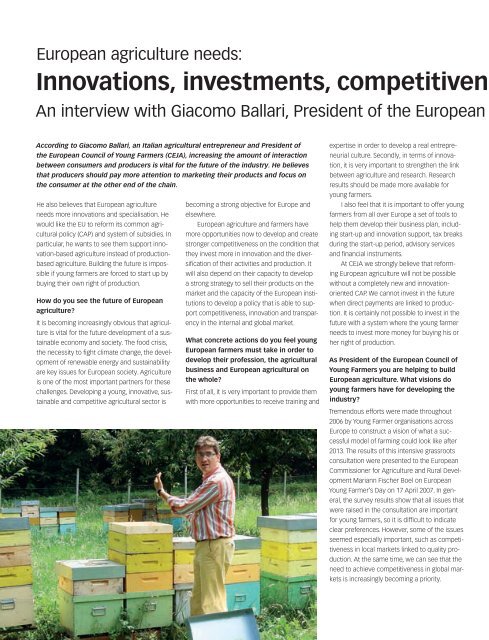You also want an ePaper? Increase the reach of your titles
YUMPU automatically turns print PDFs into web optimized ePapers that Google loves.
European agriculture needs:<br />
innovations, investments, competitiven<br />
An interview with Giacomo Ballari, President of the European<br />
According to Giacomo Ballari, an Italian agricultural entrepreneur and President of<br />
the European Council of Young Farmers (CEJA), increasing the amount of interaction<br />
between consumers and producers is vital for the future of the industry. He believes<br />
that producers should pay more attention to marketing their products and focus on<br />
the consumer at the other end of the chain.<br />
He also believes that European agriculture<br />
needs more innovations and specialisation. He<br />
would like the EU to reform its common agri-<br />
cultural policy (cAP) and system of subsidies. In<br />
particular, he wants to see them support inno-<br />
vation-based agriculture instead of production-<br />
based agriculture. Building the future is impos-<br />
sible if young farmers are forced to start up by<br />
buying their own right of production.<br />
How do you see the future of european<br />
agriculture?<br />
It is becoming increasingly obvious that agricul-<br />
ture is vital for the future development of a sustainable<br />
economy and society. The food crisis,<br />
the necessity to fight climate change, the development<br />
of renewable energy and sustainability<br />
are key issues for European society. Agriculture<br />
is one of the most important partners for these<br />
challenges. Developing a young, innovative, sustainable<br />
and competitive agricultural sector is<br />
6<br />
becoming a strong objective for Europe and<br />
elsewhere.<br />
European agriculture and farmers have<br />
more opportunities now to develop and create<br />
stronger competitiveness on the condition that<br />
they invest more in innovation and the diversification<br />
of their activities and production. It<br />
will also depend on their capacity to develop<br />
a strong strategy to sell their products on the<br />
market and the capacity of the European institutions<br />
to develop a policy that is able to support<br />
competitiveness, innovation and transparency<br />
in the internal and global market.<br />
What concrete actions do you feel young<br />
european farmers must take in order to<br />
develop their profession, the agricultural<br />
business and european agricultural on<br />
the whole?<br />
First of all, it is very important to provide them<br />
with more opportunities to receive training and<br />
expertise in order to develop a real entrepreneurial<br />
culture. Secondly, in terms of innovation,<br />
it is very important to strengthen the link<br />
between agriculture and research. Research<br />
results should be made more available for<br />
young farmers.<br />
I also feel that it is important to offer young<br />
farmers from all over Europe a set of tools to<br />
help them develop their business plan, including<br />
start-up and innovation support, tax breaks<br />
during the start-up period, advisory services<br />
and financial instruments.<br />
At cEJA we strongly believe that reforming<br />
European agriculture will not be possible<br />
without a completely new and innovationoriented<br />
cAP. We cannot invest in the future<br />
when direct payments are linked to production.<br />
It is certainly not possible to invest in the<br />
future with a system where the young farmer<br />
needs to invest more money for buying his or<br />
her right of production.<br />
As President of the european council of<br />
Young Farmers you are helping to build<br />
european agriculture. What visions do<br />
young farmers have for developing the<br />
industry?<br />
Tremendous efforts were made throughout<br />
2006 by Young Farmer organisations across<br />
Europe to construct a vision of what a successful<br />
model of farming could look like after<br />
2013. The results of this intensive grassroots<br />
consultation were presented to the European<br />
commissioner for Agriculture and Rural Development<br />
Mariann Fischer Boel on European<br />
Young Farmer’s Day on 17 April 2007. In general,<br />
the survey results show that all issues that<br />
were raised in the consultation are important<br />
for young farmers, so it is difficult to indicate<br />
clear preferences. However, some of the issues<br />
seemed especially important, such as competitiveness<br />
in local markets linked to quality production.<br />
At the same time, we can see that the<br />
need to achieve competitiveness in global markets<br />
is increasingly becoming a priority.



